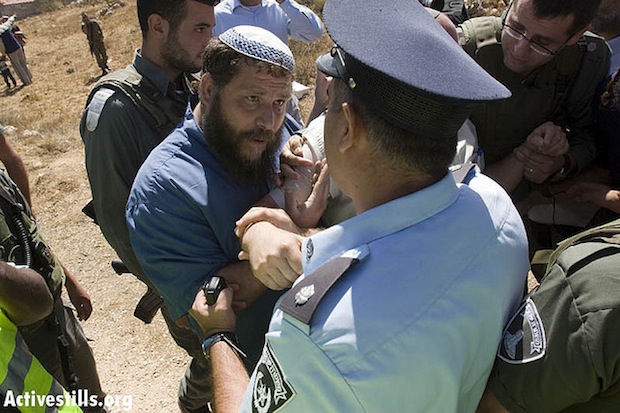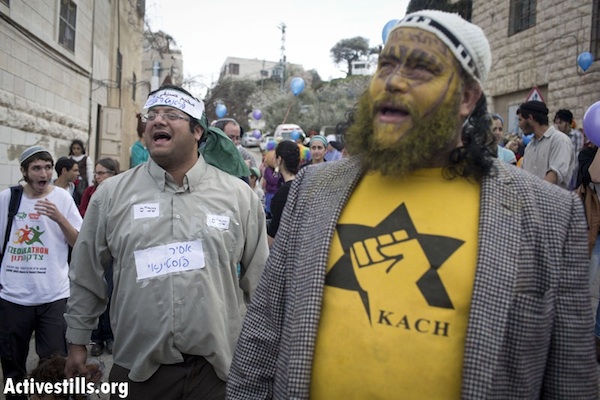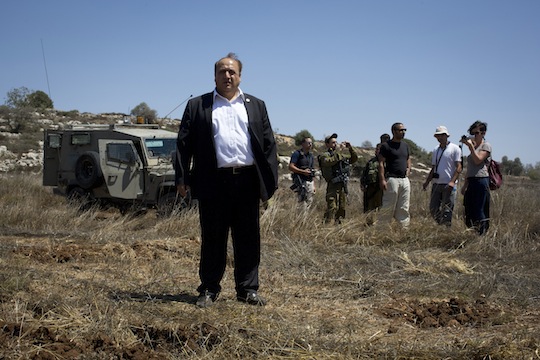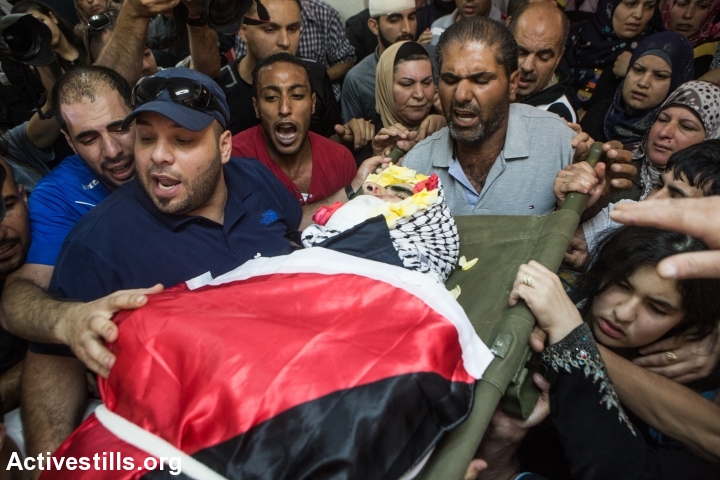For the extreme right, violence against Palestinian civilians is not solely a result of racism — it is, first and foremost, a form of control.
The vast majority of settlers are not violent, although different levels of violence toward the Palestinian population in the occupied territories have accompanied the settlement enterprise since its inception. These acts of violence are never an outlier, but as a direct consequence of the situation in the West Bank.
The public turns a blind eye to this fact whenever these events happen. The responses to the murder of the 18-month-old baby Ali Dawabshe, are a sign that we will continue to ignore the bigger picture.

The defining characteristic of the occupation is that it includes two civilian populations living alongside one another, which are subject to two different legal systems. The Palestinians live under a military regime, while every Israeli who lives or even visits the settlements “brings” the Israeli law with them, including all the legal protections she or he is granted.
The second defining characteristic of the occupation is the Israeli desire to slowly expand the territory and resources for the Jewish public, while slowly lessening Palestinians’ territory. This combination — a military regime with civilian settlement — is what causes the Israeli occupation to look and feel a lot like colonialism or apartheid, even if there is not an exact overlap. This is the essence of the regime, regardless of the question of whether or not this is our forefathers’ land, or who was here first.
Colonialism always goes hand-in-hand with racism, and extreme racism is always accompanied by violence. Even if the original motivation that brings about a colonial situation is not racist, at a certain point the ruling group must somehow justify its own privileges, which inevitably leads to racist worldviews. For example, that the occupied population is not “ready” to have all their rights, or that it is inherently weak and violent; that it doesn’t appreciate life as we do; that it prefers to live in close, dirty quarters, etc. The struggle against racism in Israel — to the degree that it even exists — will fail as long as the occupation exists, since we will always need racism in order to justify the occupation.
But racism cannot fully explain the violence toward Palestinian civilians. Some of the more infamous attempts to harm Palestinians — the Jewish Underground, which carried out a murderous attack on a seminar in Hebron and attempted to blow up five Palestinian buses, was the most well known of them — were not exceptionally racist. The Jewish Underground’s goals were first and foremost political: to prevent the possible evacuation of settlements while strengthening Jewish rule over the local population through fear, intimidation and “punishing” leading figures, as was the case with their attacks on Palestinian mayors. The excuse is always the “weakness” of the central regime — what is seen as hesitancy to implement Israeli sovereignty vis-a-vis the Palestinian population. The violence was and remains a form of control.

The history of colonialism is rife with such examples. One of the most famous ones was the Organisation de l’armée secrète, a far-right paramilitary group that used terrorism to try and prevent Algeria’s independence from French colonial rule. At one point the group began targeting French citizens, such as Sartre — who supported an end to French rule — and even President De Gaulle himself.
A similar pattern has taken shape here. The central idea behind the so-called “price tag” attacks is political — tightening control over the Palestinians through “punishment” (of innocents) whether as a response to attacks on Jews or what is seen as the weakening of Jewish grip on the West Bank, usually after demolition of structures in outposts or settlements. The most minor harassment to Palestinians are usually accompanied with talks of “the need to teach them a lesson,” “to teach them respect,” and so on.
Read: Settler violence — it comes with the territory
During my army service in the occupied territories, I encountered many of these kinds of remarks, especially in Hebron, where the friction Jews and Palestinians was and remains the most intense. Sometimes it resulted in breaking car windows or sun-heated water tanks atop of Palestinian homes. In other cases it was a slap to the face or spitting in the direction of a passerby. In Gaza and the Nablus region, the incidents usually took place near the checkpoints. I remember a few instances in which armed settlers exited their cars (especially when there was a long line, or the junction was blocked for some reason), berated and threatened the Palestinians in the very same lordly tone. It is hard to even think about that same Israeli citizen leaving his car in a traffic jam in Haifa, waving his weapon at the other drivers and yelling at the police to do their job, at least without it ending in his arrest. Why does the same person act differently on the other side of the Green Line? The difference lies in the occupation, and everyone involved knows it.

Of course Palestinians also try to harm Jews in the occupied territories — but the difference is that there is an entire system that works to deal with Palestinian violence. It does so vigorously, using tools that are unacceptable in Israel’s legal system: mass arrests without trial, warrantless searches (even in houses of non-suspects), torture, collective punishment (canceling entry permits to Palestinians whose family member was involved in terrorism), targeted assassinations, etc.
After the horrendous murder of the Fogel family in 2011, the army put the Palestinian village of Hawara under curfew, broke into houses and forcefully took D.N.A. samples from all the men of the village.
Any Palestinian who wrote a murderous manifesto such as the one published by Moshe Auerbach [Hebrew] — which explained how to look for Palestinian homes to light on fire while blocking the entrance of the house so that the victims are unable to escape — would be locked up for many years, or at least held in administrative detention. But Auerbach himself was released as a result of a procedural mistake by the prosecution.

When I served in the army, the IDF still defined its goals as ensuring the security of all the residents of the occupied territories. Today, however, it is made clear in briefings that the first goal is to protect Jews, and the idea that all Palestinians are enemies — even the “non-combatants” — is growing.
This is an unfathomable situation. We go about our lives feeling like the law is protecting us. Most of the time this system works, and when it doesn’t we become angry, and justifiably so. But the Palestinian population is vulnerable to arbitrary harassment, whether by soldiers or settlers.
While the Palestinian Authority spends 25 percent of its budget on security, its main role is to ensure the safety of Israelis, not Palestinians (this fact alone should have put an end to the age-old question of whether or not Israel still controls the Palestinians). A Palestinian policeman cannot arrest a settler, even if an attack was to take place before his own eyes. Palestinians are therefore dependent on the good will of the army, the police or the Shin Bet, and these bodies do not give much importance to protecting Palestinian life, aside for in a few exceptional cases.
Add to this the fact that the majority of Palestinian civilians killed in the West Bank are killed by the army itself. In comparison to the IDF, the violence of the extreme right is still marginal. And IDF violence is treated far more leniently than price tag attacks. Even in the most extreme cases, where there is a clear suspicious of murder by Israeli soldiers, the system’s instinct is to cover it up. When an investigation is pursued, it is done long after the incident took place and with limited resources (+972 published a series of incidents detailing stories of soldiers who killed Palestinians and were let off the hook) Punishment is almost nonexistent, aside from a few special cases (which are entirely symbolic).
In fact, the main reason the army investigates these cases is the need to enforce discipline on its troops, along with a desire to protect the military leadership from the International Criminal Court (a functional internal mechanism to investigate such crimes is one of the legal protections against these kinds of international criminal trials).
The problem begins with the highest ranks: the General Officer Commanding the IDF’s Central Command himself, who is charged with maintaining Palestinian security, was involved in the killing of an unarmed Palestinian [Hebrew]. The commander of the Binyamin Regional Brigade shot a Palestinian stone-thrower who was running away from him; a video that came to light after the incident revealed that the IDF’s version of the events was inaccurate, to say the least. These events, which take place regularly, illustrate the absurdity behind the notion that the army will protect Palestinian civilians.

Still, I do not support the recent calls to use all the means available to the IDF and the Shin Bet — which are used on Palestinians every day — against right-wing Jewish extremists. This approach will only increase the number of human rights violations by the occupation. No one is planning to place a settlement under curfew or take all of its men to D.N.A. tests, and for good reason. As I wrote earlier, violence is inseparable from the colonial reality in the occupied territories — without putting an end to that reality, there is no chance to properly deal with violence. Even if things cool down temporarily, the situation will only grow worse in the long run. The only solutions are the evacuation of settlements or equal rights for all.
There were people on the left who claimed in recent days that Prime Minister Netanyahu and Education Minister Naftali Bennett are responsible for the murder of Ali Dawabshe. But in my eyes, their responsibility is no greater than that of centrists who believe that the occupation is tolerable, or that there is “no partner” and “no alternative,” and therefore the status quo in the occupied territories must remain for the time being. The occupation and the settlements create violence. It is true that the war against Jewish terrorism should not wait for the end of military rule — but without fighting the occupation, there is no chance of winning the battle against Jewish terrorism.
This article was first published in Hebrew on Local Call. Read it here.


